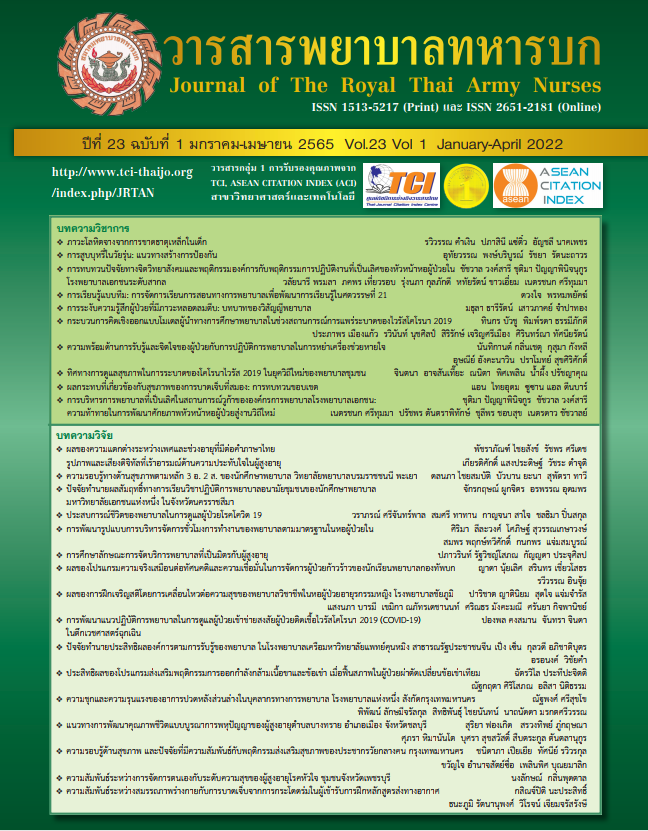Predictive Factors of Parental Behaviors on Promote Development of Executive Functions (EF) Skills among Early Childhood in Chaing Rai Province
Keywords:
predictive factors, executive functions skills, parentsAbstract
This research was cross-sectional study aimed to predict the parental behaviors and related factors promote to development of executive functions skills among early childhood in Chaingrai province. The multistage random sampling technique was used and 396 Thai early childhood and their parents were recruited in this study. The research instruments included the executive functions development assessment form and the behavioral questionnaire for promoting early childhood development, consisting of 1) personal information 2) perceived benefits of action 3) perceived barriers to action 4) perceived self-efficacy 5) activity-related affect and 6) family support. Data were analyzed by using descriptive statistics and stepwise multiple regression.
The results showed that early childhood age between 2-5 years 11 moths 29 days had a moderate level of develop executive functions skills and the behavior of the parents for promoting executive functions development had a middle level (M 3.28, SD 0.68). Parental behaviors of perceiving the barriers to action was the significantly predictor of the development of executive functions skills among childhood (R = 0.686, R2 = 0.432, p <0.001), which showed that parents’ perceived barriers had a high level, affected to promote executive functions development. Therefore, these findings suggested that providing knowledge of executive functions for parents is vital intervention for reducing the perceived barriers and improve executive functions outcome.
Downloads
References
Hockenberry MJ. Wong’s nursing care of infants and children.10thed. St. Louis: Mosby; 2015.
Chutabhakdikul N, Thanasetkorn P, Lertawasdatrakul O. Tool development and evaluation criteria for assessment of executive function in early childhood. Nakhonpathom: Institute of molecular biosciences, Mahidol university publishing; 2017. (in Thai)
Unicef. Thailand urgently needs to empower its young people with the knowledge and skills they need in order to shape the future of the nation. Bangkok: Unicef Thailand; 2019. (in Thai)
Qian Y, Shuai L, Chan RC, Qian QJ, Wang Y. The developmental trajectories of executive function of children and adolescents with attention deficit hyperactivity disorder. Research in Development Disabilities 2013; 34(5):1434-45.
The Office of the Narcotics Control Board of Thailand. Trend of drug situation of Thailand. Bangkok: The Office; 2019. (in Thai)
Kandal ER, Schwartz JH, Jessell TM, Siegelbaum SA, Hudspeth AJ. Learning and memory. In: Art, editor Principles of neural science. 5th ed, USA: McGraw-Hill; 2013. p.665-76.
The Office of the National Economic and Social Development Council. National economic and social development. Bangkok: The Office; 2017. (in Thai)
McCormack T, Hoerl C. Children’s future - oriented cognition. In: Gallego Ortiz A, editor. Advance in child development and behavior. USA: Zoe Kruge; 2020.p.215-35.
Stephanie MC, Rachel EW, Davis-Unger A. Inhibitory control and emotion regulation in preschool children. Cognitive Development 2014; 29:1-16.
Serpell ZN, Esposito AG. Development of executive functions: implications for educational policy and practice. Policy insights from the behavioral and brain sciences 2016;3(2):203-10.
Li Y, Yu D. Development of emotion word comprehension in Chinese children from 2 to 13 years old: relationships with valence and empathy. PLoS ONE 2015;10(12):92-112.
Pender NJ, Murdaugh CL, Parsons MA. Health promotion in nursing practice. 8thed. USA: Pearson; 2018.
Danyuthasilpe C. Pender’s health promotion model and its applications in nursing practice. Songklanagarind Journal of Nursing 2018;38(2):132-41. (in Thai)
Hanmathe S. A guide to executive function promotes life immunity. Bangkok: LRG; 2015. (in Thai)
Pantaewan P. Ecological model and health behavior change. Journal of The Royal Thai Army Nurses. 2017;18(2):7-15. (in Thai)
Ruksee N. The development of a program for promoting brain skill for executive cognition through sensory integration activities in preschool children. Nakhonpathom: Mahidol university publishing; 2017. (in Thai)
The Center on the Developing Child. Enhancing and practicing executive function skills with children from infancy to adolescence. Harvard University: The Center; 2014.
Sonsee S, Chaimongko N, Pongjaturawit Y. Factors associated with maternal behavior in promoting play for their preschool children. Journal of Phrapokklao Nursing College 2017;28(1):90-9. (in Thai)
Aungkaprasatchai W, Wonginjun S, Pongjaturawit Y. Predictors of health status of preschool children. The Journal of faculty of nursing of Burapha university 2018;26(3): 52-61. (in Thai).
Jindawattanawong A, Piaseu N, Nintachan P. Relationship between health belief perception and type 2 diabetic preventive behaviors in high school students. Rama Nurse J 2012; 18(2):58-69. (in Thai)
Wipulakorn A, Kapheak A, Tamud P, khumphoo P. Health-belief perception and behaviors to prevent iodine deficiency disorder. Lampang med J 2019;40(2):60-70. (in Thai)
Chutabhakdikul N. Equipping children for thailand 4.0: real-world practice. Nakhonpathom: Mahidol university publishing; 2018. (in Thai)
Downloads
Published
How to Cite
Issue
Section
License
Copyright (c) 2022 Journal of The Royal Thai Army Nurses

This work is licensed under a Creative Commons Attribution-NonCommercial-NoDerivatives 4.0 International License.
บทความหรือข้อคิดเห็นใดใดที่ปรากฏในวารสารพยาบาลทหารบกเป็นวรรณกรรมของผู้เขียน ซึ่งบรรณาธิการหรือสมาคมพยาบาลทหารบก ไม่จำเป็นต้องเห็นด้วย
บทความที่ได้รับการตีพิมพ์เป็นลิขสิทธิ์ของวารสารพยาบาลทหารบก
The ideas and opinions expressed in the Journal of The Royal Thai Army Nurses are those of the authors and not necessarily those
of the editor or Royal Thai Army Nurses Association.






